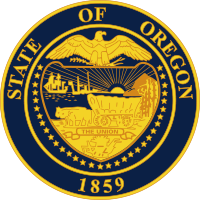Molala
The Molala (also Molale, Molalla, Molele) are a people of the Plateau culture area in the Oregon Cascades and central Oregon, United States. They are one of the Confederated Tribes of the Grand Ronde Community of Oregon, with 141 of the 882 members in the 1950s claiming Molala descent. The Confederated Tribes of Siletz Indians also has Molalla representation among its confederation of Tribes and Bands. The Siletz Reservation was established in 1855, for the Coast, Willamette and Umpqua Tribes (Rogue River and Shasta Tribes soon after added). The Molalla are one of the Tribes who signed the 1855 Willamette Valley Treaty (aka Kalapuya, etc. Treaty).
Language
The Molala language was a member of the Plateau Penutian family. It was previously considered a language isolate. Molala is now extinct.
History
The ancestral lands of the Molala people were located south of the Columbia River, with various areas occupied for seasonal resource exploitation. During the winter members of the nation resided in the vicinity of modern Tygh Valley.[1] During the spring Molalas moved to a site along the Deschutes River near what is now Antelope.[1] Stockpiles of fish would be gathered there, including the Sockeye salmon and Columbia River redband trout. Throughout the summer and autumn outside modern Wapinitia Molalas would dig for the tubers of camas and wapato, along with collecting regional berries.[1]
The Molala traditionally occupied the western slopes of the Cascade Mountain range. Relocating to portions of the Willamette Valley, the Molala had to contend with groups of Cayuse warriors that occasionally attacked their settlements for slaves. During the last known Cayuse raid, likely in the late 1820s,[2] a Molala nobleman was killed. A Clackamas man was used as an intermediary between local Molala soldiers and the Cayuse raiders to arrange for a second battle.[2] The fighting was likely held at Minto Pass,[3] and lasted for two days, the Molalas considering it a victory.[2]
In 1848 Molala war chief Loshuk (Crooked Finger) headed 150 warriors (Molala, Klamath, Umpqua, Rogue, Atsugewi, Achomawi, Modoc) against the white men in the Willamette Valley, but they were ambushed near the Butte Creek, and their village on the Abiqua Creek shore was attacked.[4] Crooked Finger and his warriors took part in the Cayuse War, as allies of their kinsmen.
Footnotes
- Verne F. Ray, George Peter Murdock, Beatrice Blyth, Omer C. Stewart, Jack Harris, E. Adamson Hoebel and D. B. Shimkin Tribal Distribution in Eastern Oregon and Adjacent Regions. American Anthropologist 40, No. 3 (1938), pp. 384-415.
- MacKey, Harold. New Light on the Molala Indians. Oregon Historical Quarterly 73, No. 1 (1972), pp. 63-65.
- Minto, John. Minto Pass: Its History, and an Indian Tradition. The Quarterly of the Oregon Historical Society 4, No. 3 (1903), pp. 241-250.
- Lewis, David G. (December 30, 2017). "The Battle of Abiqua, Second Battle of the Willamette Valley". Ethnohistory Research, LLC. Retrieved May 14, 2019.
Further reading
- John B. Horner, "Oregon: Her History, Her Great Men, Her Literature." Portland, OR: J.K. Gill Co., 1919.
- Marianne Mithun,The Languages of Native North America. Cambridge England: Cambridge University Press, 1999.
- Nicholas J. Pharris, Nicholas J., Winuunsi Tm Talapaas: A Grammar of the Molalla Language. Ph.D. dissertation, University of Michigan, 2006.
